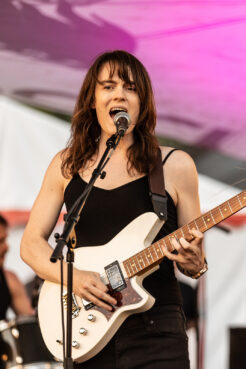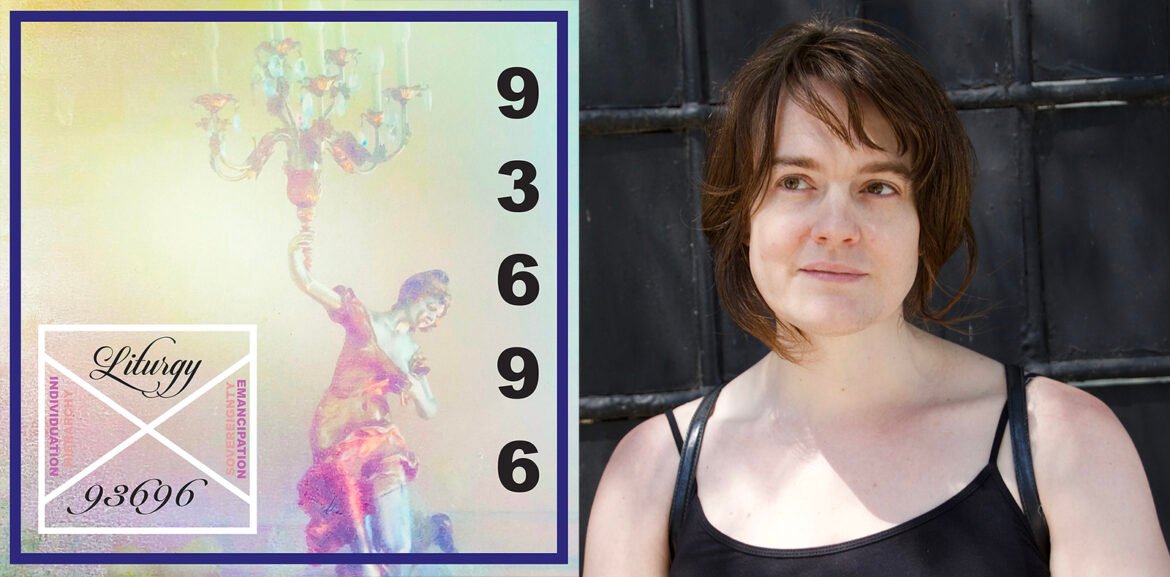NEW YORK (RNS) — Onstage with only a guitar, microphone and pedal board, Haela Hunt-Hendrix can sound angelic one moment and feral the next. Her solo set, drawing from songs from across her band Liturgy’s six-album catalog, shifts between delicate, hymnlike passages and bloodcurdling screams that leave audiences hushed in anticipation. The music is both hypnotic and jarring, seemingly determined to unsettle.
Hunt-Hendrix, 40, is best known as the front woman of Liturgy, the Brooklyn avant-garde black metal band that has divided listeners since its 2008 EP debut, “Immortal Life.” Over the past 15 years, the band has redefined what metal can sound like, blending its signature burst beats, a rhythm more flexible and repetitive than the genre’s standard blast beat, and howls with choral arrangements, classical influences and theological themes. The band’s minimalist aesthetic has remained, but theological and philosophical symbols have become more prominent in newer work.
In 2020, Hunt-Hendrix came out publicly as queer and now identifies as a transgender woman. Four years later, she was christened into the Orthodox Christian church in New York City. Her solo tour this summer, which started in Manhattan on Aug. 1 and ends Saturday (Sept. 6), includes first-time performances in Turkey, Indonesia and Malaysia. The set reflects Hunt-Hendrix’s rare blend of spiritual and personal reflections, weaving together her embrace of queerness, her Orthodox faith and her relentless reshaping of metal music.
“Queerness and metal is a pretty hard mix,” Hunt-Hendrix said in an interview with RNS. “Then queerness and faith is a hard mix, and metal and faith is a hard mix. But, like, there’s a kind of a logic to it. My personal opinion is that I’m in touch with the truth or something, and that more and more people will sort of see the truth over time.”
This sense of mission has been with her for more than a decade. In 2009, Hunt-Hendrix presented her academic and artistic manifesto, “Transcendental Black Metal: A Vision of Apocalyptic Humanism,” at the Black Metal Theory symposium, later published in the “Hideous Gnosis” compendium and circulated online. In it, she argued that black metal’s trademark nihilism and darkness could be recast as transcendent, even sacred, and that Liturgy would be the band to lead the transformation.
“Black metal is really esoteric, kind of scary, but, maybe in touch (with) a sort of authentic religiosity, even though it’s so dark,” Hunt-Hendrix said. “To me, I really wanted to push that even further — kind of like Christ descending into hell and being resurrected.”

Haela Hunt-Hendrix plays at the Moers Festival 2022 in Moers, Germany. (Photo by Harald Krichel/Wikimedia/Creative Commons)
If black metal, to some, represents hell, then its resurrection in Hunt-Hendrix’s vision is “transcendental black metal,” she said.
“My music is all about God,” Hunt-Hendrix said. “It’s like I’m seeking to paint a picture of heaven, or bring God, and that’s always just kind of felt like something I had to do.”

